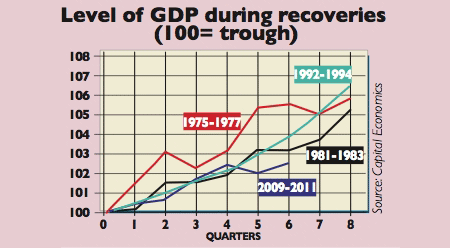
The preliminary estimate of the first quarter’s GDP showed that the UK economy avoided a double-dip recession with its growth of 0.5%, recovering from the 0.5% fall in 2010’s final quarter. This suggests that the economy has flatlined since the third quarter of last year. The Office for National Statistics had said that the heavy snow was behind the October-December dip, so the weather-induced fall has been made up, but no extra growth has been added.
What the commentators said
“We should all be careful about drawing forthright conclusions from one set of data, particularly a preliminary one such as this,” Hamish McRae pointed out in The Independent. This first estimate covers only 42% of the data needed to produce a full GDP figure and such estimates are often revised up. The numbers also contrast with some recent survey evidence and the bounce in employment. Deutsche Bank added that a slide in construction and energy production prevented a sharper rebound, but these sectors comprise less than 10% of the economy. Services, which cover 75% of GDP, grew strongly. Indeed, 90% of the economy grew in the first quarter, compared to just 15% in the previous three months.
Still, it seems that the bursting of the credit bubble “has done lasting damage”, said Jeremy Warner on Telegraph.co.uk. “The bounce-back capacity the economy has shown after most post-war recessions seems to be sadly lacking this time.” Nor will it get any easier from here, as the “full force of the spending cuts” has yet to come. Meanwhile, consumers are rattled by falling real wages. Judging by this week’s survey of manufacturing production, the sector remains strong but “may be gradually coming off the boil”, according to Howard Archer of IHS Global Insight.
Adding to the uncertainty is the extra bank holiday this quarter, thanks to the royal wedding. Retailers in London could get a boost, but with fewer people working the overall impact may be a marginal hit of 0.2%-0.3% to GDP, reckons David Kern of the British Chamber of Commerce. “That, in turn, will skew any third-quarter comparison with a potentially depressed second quarter,” said Chris Giles in the Financial Times. It will be some time before the Bank of England can examine data untainted by special effects. On the plus side, it points to the first UK interest-rate hike being pushed further back.